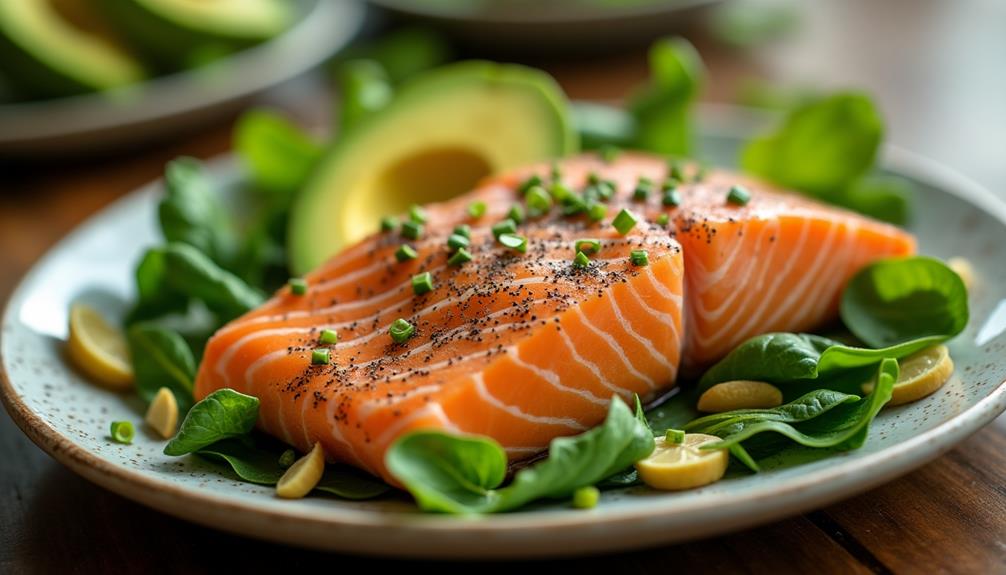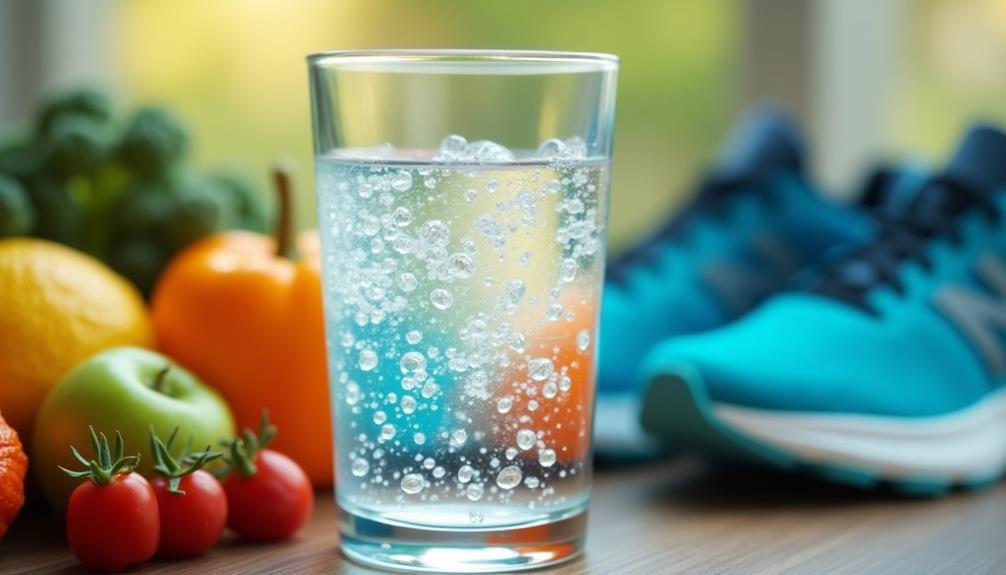To support muscle repair and recovery, focus on these seven essential nutrients. First, consume protein, which is key for muscle recovery, especially when from sources like whey protein. Next, Omega-3 fatty acids reduce inflammation and improve protein synthesis; find them in fish and flaxseeds. Don't forget Vitamins C and E, which aid collagen production and protect cells. B vitamins enhance metabolism and red blood cell production. Magnesium helps with muscle function and soreness relief. Zinc promotes protein synthesis and hormonal balance. Finally, stay hydrated with water for best recovery. There's much more to uncover about these nutrients' benefits.
Core Insights
- Protein is crucial for muscle repair, consisting of amino acids that help recover after workouts.
- Omega-3 fatty acids reduce inflammation, support muscle repair, and enhance protein synthesis.
- Vitamins C and E protect against oxidative damage and boost immune function, aiding recovery.
- B Vitamins, particularly B6 and B12, support protein metabolism and red blood cell production for better performance.
- Magnesium and zinc are essential for muscle function, reducing soreness, and promoting protein synthesis and hormonal balance.
Protein

When you engage in intense workouts, your muscles experience tiny tears that need repair, and that's where protein comes into play. Protein is an essential nutrient that helps rebuild and strengthen muscle fibers after exercise. It's made up of amino acids, which are the building blocks of muscle tissue. Consuming protein post-workout accelerates recovery and promotes muscle growth. Whey protein powders are a popular choice among fitness enthusiasts, typically offering 24-25g of protein per serving, with some formulations providing even more. These supplements also contain branched-chain amino acids (BCAAs), which can aid in muscle recovery and reduce bloating.
Aim for a protein-rich meal or snack within 30 minutes of finishing your workout. Good sources include chicken, fish, eggs, legumes, and dairy products. If you struggle to meet your protein needs through food alone, consider protein supplements. Remember, balancing protein intake with carbohydrates and fats is essential for peak recovery and overall health. Prioritize protein to support your fitness journey!
Omega-3 Fatty Acids

You might not realize it, but omega-3 fatty acids play an essential role in muscle repair and overall recovery. These healthy fats, found in fish, flaxseeds, and walnuts, support your body's inflammation response. When you exercise, tiny tears occur in your muscle fibers. Omega-3s help reduce inflammation, which can speed up the healing process. Similar to prebiotics for gut health, omega-3s contribute to overall wellness by supporting digestive function and immune health.
Additionally, they may enhance protein synthesis, allowing your muscles to rebuild stronger. Including omega-3s in your diet can also improve joint health, making movement easier as you recover. Aim for two servings of fatty fish per week or consider high-quality supplements if you're not a fan of seafood. Incorporating these nutrients into your routine can lead to better recovery and improved performance in your workouts.
Vitamins C and E

Here's a quick comparison of their benefits:
| Vitamin | Benefits | Sources |
|---|---|---|
| Vitamin C | Boosts collagen production | Citrus fruits, peppers |
| Vitamin E | Protects cell membranes | Nuts, seeds, spinach |
| Both | Reduce oxidative damage | Fruits, vegetables |
| Support immune function | Avocado, broccoli |
Incorporating these vitamins into your diet can enhance recovery after workouts, helping you bounce back stronger. Make sure you're getting enough of both for peak muscle health.
B Vitamins

Vitamin B6 aids in protein metabolism, which is vital for muscle repair. Meanwhile, vitamin B12 supports red blood cell production, ensuring your muscles receive the oxygen they need. Immune system support is another pivotal benefit of B vitamins, helping athletes maintain overall health and reduce infection risks during intense training periods.
Incorporating foods rich in B vitamins, like leafy greens, whole grains, and lean meats, can enhance your recovery. By prioritizing B vitamins, you're setting the stage for more effective muscle repair and improved performance.
Magnesium

Many athletes overlook magnesium, but it's necessary for muscle repair and recovery. This mineral plays an important role in muscle function, helping to regulate contractions and relaxations. When you exercise, magnesium helps convert glucose into energy, which is essential for performance and stamina.
Additionally, magnesium aids in reducing inflammation and muscle soreness after workouts, promoting faster recovery. You can find magnesium in foods like leafy greens, nuts, seeds, and whole grains. If you're not getting enough from your diet, consider a supplement, but consult with a healthcare professional first.
Zinc

Zinc is an important mineral that plays a significant role in muscle repair and recovery. It helps with protein synthesis, which is essential for muscle growth. Including zinc in your diet can enhance your overall recovery after workouts. Here are four key benefits of zinc for muscle repair:
- Supports Immune Function: Zinc boosts your immune system, helping you fend off illness during intense training.
- Promotes Protein Synthesis: It aids in the process of building new muscle tissue.
- Reduces Inflammation: Zinc has anti-inflammatory properties that can ease muscle soreness.
- Enhances Hormonal Balance: It helps regulate hormones like testosterone, which are crucial for muscle development.
Incorporating zinc-rich foods can be a game-changer for your recovery routine.
Water

To support recovery, aim to drink water consistently throughout the day. Pay attention to your body's signals; thirst is a clear indicator that you need fluids. Additionally, consider your activity level. If you've had an intense workout, you might need more hydration.
Incorporate foods with high water content, like fruits and vegetables, to boost your intake. Overall, staying well-hydrated will support your muscles' healing, allowing you to recover faster and perform better.
Frequently Asked Questions
How Do Essential Nutrients Affect Muscle Recovery Time?
Essential nutrients speed up your muscle recovery time by providing the necessary building blocks for repair. They help reduce inflammation, replenish energy stores, and support overall recovery, so you can get back to your workouts faster.
Can Supplements Replace Food Sources for Muscle Repair?
Supplements can't fully replace food sources for muscle repair. You need whole foods for a range of nutrients, fiber, and antioxidants that support recovery. While convenient, supplements should complement, not substitute, your diet.
Are There Risks of Overconsuming These Nutrients?
Overconsuming nutrients can feel like drinking a gallon of protein shakes daily! You risk digestive issues, nutrient imbalances, and even toxicity. Balancing your intake is key to staying healthy and maximizing your performance.
How Do Hydration Levels Impact Muscle Recovery?
Hydration levels greatly impact muscle recovery. When you're well-hydrated, your body efficiently transports nutrients and removes waste. Dehydration, on the other hand, can lead to cramping and prolonged soreness, hindering your recovery process.
Can Diet Alone Support Effective Muscle Repair?
You might think diet alone's enough, but it's essential to balance it with other factors. While nutrients play a role, don't underestimate rest, hydration, and activity levels—they're just as crucial for effective muscle repair.

